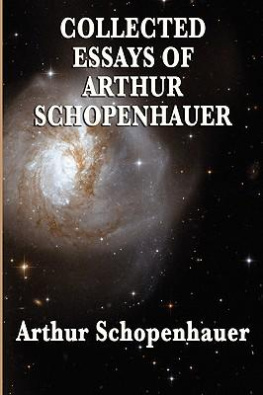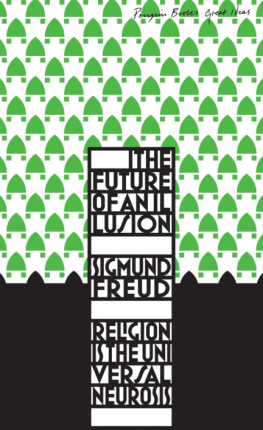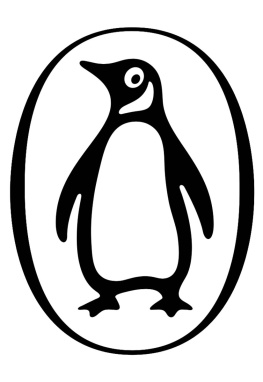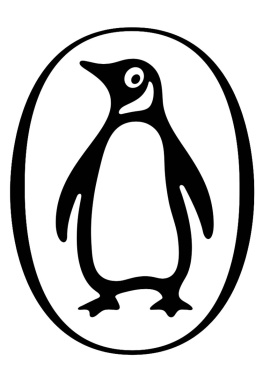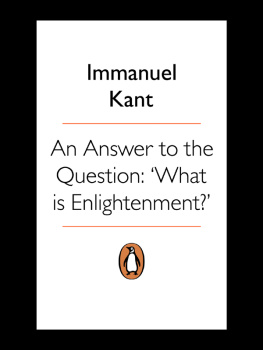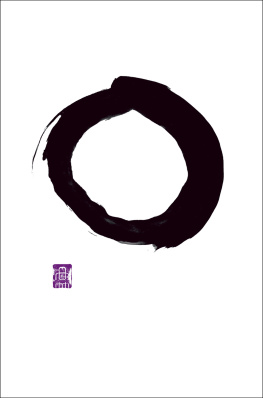SCHOPENHAUER - On the suffering of the world
Here you can read online SCHOPENHAUER - On the suffering of the world full text of the book (entire story) in english for free. Download pdf and epub, get meaning, cover and reviews about this ebook. City: London, year: 2004, publisher: Penguin Books Ltd, genre: Science. Description of the work, (preface) as well as reviews are available. Best literature library LitArk.com created for fans of good reading and offers a wide selection of genres:
Romance novel
Science fiction
Adventure
Detective
Science
History
Home and family
Prose
Art
Politics
Computer
Non-fiction
Religion
Business
Children
Humor
Choose a favorite category and find really read worthwhile books. Enjoy immersion in the world of imagination, feel the emotions of the characters or learn something new for yourself, make an fascinating discovery.

- Book:On the suffering of the world
- Author:
- Publisher:Penguin Books Ltd
- Genre:
- Year:2004
- City:London
- Rating:3 / 5
- Favourites:Add to favourites
- Your mark:
- 60
- 1
- 2
- 3
- 4
- 5
On the suffering of the world: summary, description and annotation
We offer to read an annotation, description, summary or preface (depends on what the author of the book "On the suffering of the world" wrote himself). If you haven't found the necessary information about the book — write in the comments, we will try to find it.
On the suffering of the world — read online for free the complete book (whole text) full work
Below is the text of the book, divided by pages. System saving the place of the last page read, allows you to conveniently read the book "On the suffering of the world" online for free, without having to search again every time where you left off. Put a bookmark, and you can go to the page where you finished reading at any time.
Font size:
Interval:
Bookmark:
Arthur Schopenhauer
17881860
Arthur Schopenhauer
TRANSLATED BY R.J. HOLLINGDALE
PENGUIN BOOKS GREAT IDEAS
PENGUIN BOOKS
Published by the Penguin Group
Penguin Books Ltd, 80 Strand, London WC2R 0RL , England
Penguin Group (USA) Inc., 375 Hudson Street, New York, New York 10014, USA
Penguin Books Australia Ltd, 250 Camberwell Road, Camberwell, Victoria 3124, Australia
Penguin Books Canada Ltd, 10 Alcorn Avenue, Toronto, Ontario, Canada, M4V 3B2
Penguin Books India (P) Ltd, 11 Community Centre, Panchsheel Park, New Delhi 110 017, India
Penguin Group (NZ), Cnr Airborne and Rosedale Roads, Albany, Auckland 1310, New Zealand
Penguin Books (South Africa) (Pty) Ltd, 24 Sturdee Avenue, Rosebank 2196, South Africa
Penguin Books Ltd, Registered Offices: 80 Strand, London, WC2R 0RL , England
www.penguin.com
Parerga and Paralipomena first published 1850
First published in Penguin Classics as Essays and Aphorisms 1970
This selection first published in Penguin Books 2004
Translation copyright R. J. Hollingdale, 1970
All rights reserved
Taken from the Penguin Classics edition of Essays and Aphorisms, translated and introduced by R. J. Hollingdale
Except in the United States of America, this book is sold subject to the condition that it shall not, by way of trade or otherwise, be lent, re-sold, hired out, or otherwise circulated without the publishers prior consent in any form of binding or cover other than that in which it is published and without a similar condition including this condition being imposed on the subsequent purchaser
ISBN: 978-0-14-196491-1
If the immediate and direct purpose of our life is not suffering then our existence is the most ill-adapted to its purpose in the world: for it is absurd to suppose that the endless affliction of which the world is everywhere full, and which arises out of the need and distress pertaining essentially to life, should be purposeless and purely accidental. Each individual misfortune, to be sure, seems an exceptional occurrence; but misfortune in general is the rule.
Just as a stream flows smoothly on as long as it encounters no obstruction, so the nature of man and animal is such that we never really notice or become conscious of what is agreeable to our will; if we are to notice something, our will has to have been thwarted, has to have experienced a shock of some kind. On the other hand, all that opposes, frustrates and resists our will, that is to say all that is unpleasant and painful, impresses itself upon us instantly, directly and with great clarity. Just as we are conscious not of the healthiness of our whole body but only of the little place where the shoe pinches, so we think not of the totality of our successful activities but of some insignificant trifle or other which continues to vex us. On this fact is founded what I have often before drawn attention to: the negativity of well-being and happiness, in antithesis to the positivity of pain.
I therefore know of no greater absurdity than that absurdity which characterizes almost all metaphysical systems: that of explaining evil as something negative. For evil is precisely that which is positive, that which makes itself palpable; and good, on the other hand, i.e. all happiness and all gratification, is that which is negative, the mere abolition of a desire and extinction of a pain.
This is also consistent with the fact that as a rule we find pleasure much less pleasurable, pain much more painful than we expected.
A quick test of the assertion that enjoyment outweighs pain in this world, or that they are at any rate balanced, would be to compare the feelings of an animal engaged in eating another with those of the animal being eaten.
The most effective consolation in every misfortune and every affliction is to observe others who are more unfortunate than we: and everyone can do this. But what does that say for the condition of the whole?
History shows us the life of nations and finds nothing to narrate but wars and tumults; the peaceful years appear only as occasional brief pauses and interludes. In just the same way the life of the individual is a constant struggle, and not merely a metaphorical one against want or boredom, but also an actual struggle against other people. He discovers adversaries everywhere, lives in continual conflict and dies with sword in hand.
Not the least of the torments which plague our existence is the constant pressure of time, which never lets us so much as draw breath but pursues us all like a taskmaster with a whip. It ceases to persecute only him it has delivered over to boredom.
And yet, just as our body would burst asunder if the pressure of the atmosphere were removed from it, so would the arrogance of men expand, if not to the point of bursting then to that of the most unbridled folly, indeed madness, if the pressure of want, toil, calamity and frustration were removed from their life. One can even say that we require at all times a certain quantity of care or sorrow or want, as a ship requires ballast, in order to keep on a straight course.
Work, worry, toil and trouble are indeed the lot of almost all men their whole life long. And yet if every desire were satisfied as soon as it arose how would men occupy their lives, how would they pass the time? Imagine this race transported to a Utopia where everything grows of its own accord and turkeys fly around ready-roasted, where lovers find one another without any delay and keep one another without any difficulty: in such a place some men would die of boredom or hang themselves, some would fight and kill one another, and thus they would create for themselves more suffering than nature inflicts on them as it is. Thus for a race such as this no stage, no form of existence is suitable other than the one it already possesses.
Since, as we recalled above, pleasure and well-being is negative and suffering positive, the happiness of a given life is not to be measured according to the joys and pleasures it contains but according to the absence of the positive element, the absence of suffering. This being so, however, the lot of the animals appears more endurable than that of man. Let us look at both a little more closely.
However varied the forms may be which human happiness and misery assume, inciting man to seek the one and flee from the other, the material basis of them all is physical pleasure or physical pain. This basis is very narrow: it consists of health, food, protection from wet and cold, and sexual gratification; or the lack of these things. Man has, consequently, no larger share of real physical pleasure than the animals have, except perhaps to the extent that his more highly charged nervous system intensifies every sensation of pleasure as it also does every sensation of pain. Yet how much stronger are the emotions aroused in him than those aroused in the animals! how incomparably more profound and vehement are his passions! and all to achieve exactly the same result in the end: health, food, covering, etc.
This arises first and foremost because with him everything is powerfully intensified by thinking about absent and future things, and this is in fact the origin of care, fear and hope, which, once they have been aroused, make a far stronger impression on men than do actual present pleasures or sufferings, to which the animal is limited. For, since it lacks the faculty of reflection, joys and sorrows cannot accumulate in the animal as they do in man through memory and anticipation. With the animal, present suffering, even if repeated countless times, remains what it was the first time: it cannot sum itself up. Hence the enviable composure and unconcern which characterizes the animal. With man, on the other hand, there evolves out of those elements of pleasure and suffering which he has in common with the animal an intensification of his sensations of happiness and misery which can lead to momentary transports which may sometimes even prove fatal, or to suicidal despair. More closely considered, what happens is this: he deliberately intensifies his needs, which are originally scarcely harder to satisfy than those of the animal, so as to intensify his pleasure: hence luxury, confectionery, tobacco, opium, alcoholic drinks, finery and all that pertains to them. To these is then added, also as a result of reflection, a source of pleasure, and consequently of suffering, available to him alone and one which preoccupies him beyond all measure, indeed more than all the rest put together: ambition and the sense of honour and shame in plain words, what he thinks others think of him. This, in a thousand, often curious shapes then becomes the goal of all those endeavours of his which go beyond physical pleasure or pain. He excels the animal in his capacity for enjoying intellectual pleasures, to be sure, and these are available to him in many degrees, from the simplest jesting and conversation up to the highest achievements of the mind; but as a counterweight to this, on the side of suffering stands boredom, which is unknown to the animals at least in the state of nature and is only very slightly perceptible in the very cleverest domesticated ones, while to man it has become a veritable scourge. Want and boredom are indeed the twin poles of human life. Finally it remains to be mentioned that with man sexual gratification is tied to a very obstinate selectivity which is sometimes intensified into a more or less passionate love. Thus sexuality becomes for man a source of brief pleasure and protracted suffering.
Font size:
Interval:
Bookmark:
Similar books «On the suffering of the world»
Look at similar books to On the suffering of the world. We have selected literature similar in name and meaning in the hope of providing readers with more options to find new, interesting, not yet read works.
Discussion, reviews of the book On the suffering of the world and just readers' own opinions. Leave your comments, write what you think about the work, its meaning or the main characters. Specify what exactly you liked and what you didn't like, and why you think so.

